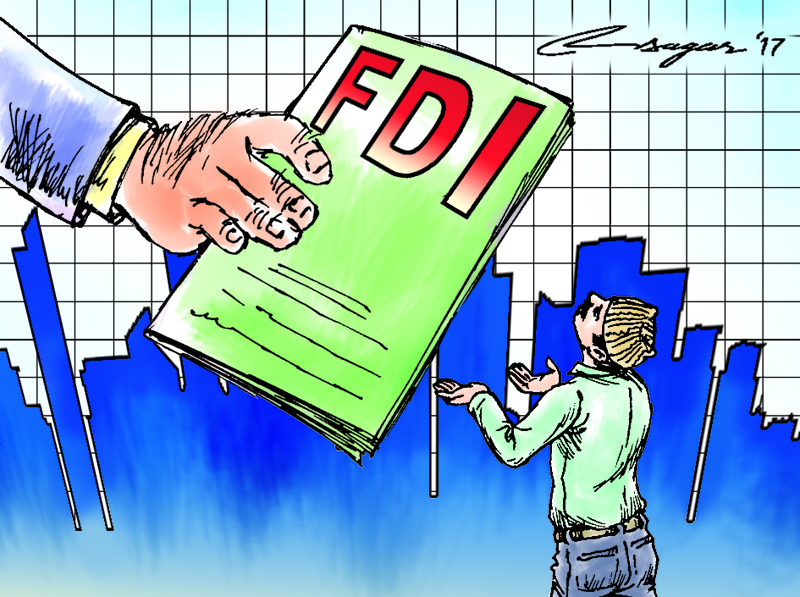Foreign direct investment: Investment-friendly climate
Both economic theory and empirical evidence generally indicate that FDI has a beneficial impact on the host country. It can enhance enterprise and human capital development, create jobs, and stimulate technology spillovers
Foreign direct investment (FDI) is a principal avenue of development finance. Since it can contribute to economic development, governments want to attract it.
Indeed, the global demand for such investment is highly competitive, and developing countries are making significant improvements in their investment regimes, including the granting of non-discriminatory treatment to foreign investors and the elimination of most restrictions on capital movements.
According to UNCTAD’s World Investment Report 2016, FDI inflows to developing economies reached a new high of $765 billion in 2015, 9 per cent higher than in 2014.
The economic determinants of FDI are vital, the major ones being market size and per capita income, access to regional and global markets, market growth, raw materials, skilled labor, physical infrastructure, and technology. Likewise, broader economic policies, including corporate taxes, trade openness and other business climate issues such as regulations are also crucial.
Similarly, a transparent and dependable legal framework and a simple investment approval process are also crucial. However, political instability and violence makes a country less appealing for FDI, since they make the economic and political environment less predictable. FDI is regarded as one of the prime transmission vehicles of advanced technology from developed to developing countries.
Generally speaking, poor developing economies are short of the major necessary conditions in order to be able to innovate and spawn new discoveries and designs. Accordingly, they have to benefit from the diffusion of technology that stems from elsewhere, and it is through FDI from advanced economies that the technological diffusion can take place.
FDI can also assist developing countries to convert their comparative advantages into competitive advantages. Moreover, evidence illustrates that FDI increases the productivity of host firms and the wider economy, as well as contributing to increased job numbers and other broader spillovers.
In Nepal, it was the Sixth Plan (1980/81-1984/85) that for the first time incorporated a policy for utilizing foreign capital and technology stating that foreign investment and technology were primarily required in large-scale industries and mineral industries.
Currently, the country’s major foreign investment laws include the Foreign Investment and Technology Transfer Act of 1992 (since amended), the Foreign Investment Policy of 2015, the Foreign Exchange Regulation Act of 1962, and the annual budget, which summarizes customs, duties, export service charges, sales, airfreight and income taxes, and other excise taxes that impact foreign investment.
The Foreign Investment Policy 2015 aims at facilitating the development and expansion of infrastructure, bringing in modern technology and managerial and technical skills, and generating employment opportunities by attaining higher rate of economic growth, among others.
Priority sectors, as defined by the Policy, include a) hydroelectricity, b) transport infrastructures (c) agricultural industries, food and herb processing, d) tourism and e) mining and manufacturing. The Policy states that foreign investors will be treated on par with domestic investors, and industries operated by foreign investors would not be nationalized.
So far, however, Nepal has not been able to attract a significant amount of FDI. This has been attributed to a number of factors, some of which stand out prominently. In the first place, the political instability and ensuing policy and legal uncertainty imply that foreign investors would contemplate twice prior to investing in Nepal.
Secondly, poor infrastructure, especially power and transportation network, which escalate the cost of doing business in Nepal, acts as a strong disincentive for foreign investors to invest in Nepal. In this respect, the World Bank’s Doing Business 2017 shows that out of 190 countries, Nepal’s rank in “Ease of Doing Business” fell from 99th position in 2016 to 107th in 2017.
Third, the different trade unions with sometimes inconceivable demands have hampered the business climate of the country. Fourth, overlapping laws and institutional arrangements, differing priorities of different agencies of the government, together with critical gaps between policies and their actual implementation have also acted as hindrances in the creation of an investment friendly environment in the country.
Still, the country is pursuing strategies and aggressively seeking FDI which is critical for economic growth. In this regard, the Ministry of Industry together with the Investment Board of Nepal is organizing Nepal Investment Summit on the theme ‘Harnessing Investment Opportunities in Nepal’ during 2-3 March 2017 with the aim of encouraging foreign investment and promoting linkages between domestic and foreign investors.
Economic theory and empirical evidence generally indicate that FDI has a beneficial impact on the host country. It can enhance enterprise and human capital development, create jobs, and stimulate technology spillovers.
While political and economic stability as well as continuity and predictability of policy are essential, it is primarily government’s responsibility to make sure that these are in place so that FDI can contribute to development goals.
Pant is with Nepal Rastra Bank






